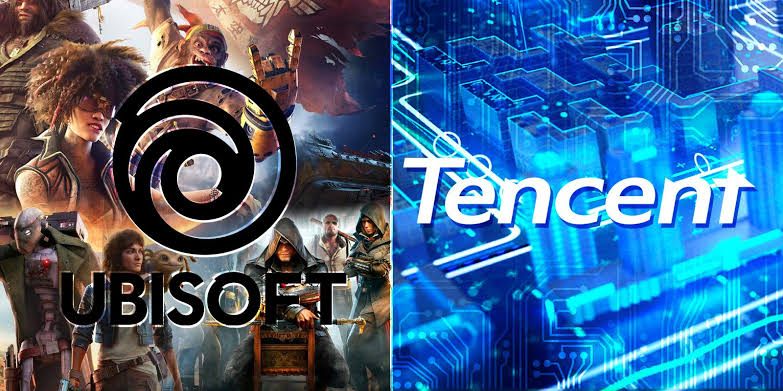Tencent made a big purchase of a 25% stake in Ubisoft's subsidiary.
On March 27, French gaming giant Ubisoft announced a capital operation that shook the global gaming industry: it spun off its three core IPs, Assassin's Creed, Far Cry and Rainbow Six, and injected them into the newly established subsidiary. China technology giant Tencent invested 1.16 billion euros in cash to obtain a 25% stake in the subsidiary. After the transaction is completed, the overall valuation of the subsidiary will reach 4 billion euros, and full delivery is expected to be completed before the end of 2025.
This valuation far exceeds Ubisoft's current market value of 1.905 billion euros, and is even equivalent to four times its average annual sales from 2023 to 2025, triggering fierce debate in the market over asset pricing logic.

Strategic motivation: Ubisoft's broken arm survival versus Tencent's IP card slot war
Ubisoft has been in deep financial difficulties in recent years. Its 2023 financial report shows that its net profit fell 34% year-on-year, and its market value has shrunk by more than 60% from its historical high.The spin-off of the three major IPs to form an asset-light subsidiary is essentially to securitize the best quality assets to quickly obtain liquidity, optimize the balance sheet by introducing Tencent Capital, while retaining actual control over the core IPs.
Ubisoft CEO Yves Guillemot bluntly stated in a statement that the move aims to "unleash the creative potential of the team and deeply bind resources to player needs," implying that traditional stand-alone game manufacturers are moving to service-oriented games (GaaS). The urgency of transformation.
Tencent's entry continues its dual-track strategy of "global IP localization + local IP globalization"-previously, the liquidity of Western IP in the China market has been verified by acting for products such as League of Legends and PUBG Mobile. This time, directly Holding top-level IP development rights can not only avoid policy risks, but also deeply participate in the design of the game economic system, laying the foundation for the construction of a cross-platform ecosystem.
It is worth noting that Tencent and the Gillimott family discussed the possibility of Ubisoft's privatization as early as 2024, and this transaction may reserve an interface for subsequent capital operations.
Valuation Logic Dispute: A Paradigm Breakthrough in IP Capitalization Pricing
The market's doubts about the valuation of 4 billion euros focus on two points: First, the spin-off assets accounted for 68% of Ubisoft's 2024 revenue, but the valuation of subsidiaries is already 2.1 times the market value of the parent company; Second, the three major IPs have market performance in recent years. Weak, although "Assassin's Creed: Shadow"'s first-day sales revenue hit the second-highest in the series, the player Retention rate dropped by 12% compared with the previous one.
However, David Cole, an analyst at DFC Intelligence, pointed out that traditional valuation models are difficult to quantify the long-term user stickiness and cross-media development potential of top-level IPs.Taking Assassin's Creed as an example, the proportion of revenue from derivative films, peripherals, theme parks, etc. has increased from 8% in 2019 to 23% in 2024. Ubisoft plans to strengthen social functions and F2P in its new subsidiaries.(Free to Play) model, the multiplier effect of such high-margin businesses on valuation has not yet been fully reflected.
If we refer to Take-Two's pricing logic for "IP+ mobile mobility capabilities" when acquiring Zynga for US$12.7 billion, the EV/EBITDA multiple (18.7 times) implied in the 4 billion euro valuation is still lower than the industry average M & A level (22-25 times).
Industrial Transformation Deep Water Area: Service Games Reconstructing Development Paradigm
The transaction exposed a systemic crisis in the traditional 3A game business model.Ubisoft's new subsidiary clearly regards "increasing the frequency of content publishing, expanding multiplayer games, and integrating social functions" as its strategic focus, which coincides with the path of successful products such as "Original God" and "Tower of Fantasy" to maintain user activity through high-frequency updates.
It is worth noting that service-oriented games require development teams to shift from a "project approach" to an "operation approach", which poses organizational challenges to Ubisoft's studios in Montreal, Barcelona and other places.
Tencent's empowerment may not only be limited to the financial level-the accumulated version iteration experience, user behavior data analysis capabilities, and the potential diversion value of the WeChat social chain by its "King's Glory" team will all become the key variables of the subsidiary's exploration of "multi-platform evergreen ecology."However, the conflict between the Eastern and Western teams in development concepts cannot be ignored. For example, Ubisoft has publicly criticized China players for their over-reliance on social functions as "fundamentally different from Western development logic."
Risk exposure: The sword of Damocles for highly leveraged IP operations
Although the deal eased Ubisoft's cash flow pressure in the short term, there were multiple concerns in the long run.First of all, after the spin-off, there are only second-tier brands such as "Ghost Operation" and "Territory Blockade" in the remaining IP matrix of the parent company. The new IP incubation capabilities are further weakened by resource tilt towards subsidiaries.
Secondly, Tencent's aggressive investment in service-oriented games may lead to over-commercialization of classic IP. For example, after "Rainbow Six" switches to the F2P model, if the paid design is unbalanced, it may cause the loss of core players.The more far-reaching impact is that when the global game industry enters the era of "IP oligarchy", the living space of small and medium-sized manufacturers may be further compressed by the dual barriers of capital and IP.
As an anonymous developer at Ubisoft Montreal studio said on social media: "We are witnessing a historic transition in the game industry from innovation-driven to capital-driven.”
